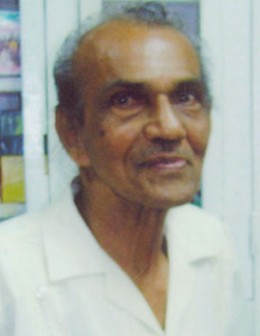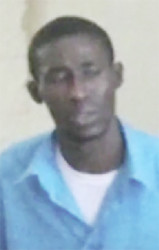There was a caustic exchange between Attorney Nigel Hughes, who is representing Orvin Kevin Roberts and Leonard Rachpaul, son of the Robb Street drugstore owner Harold Rachpaul, Roberts is accused of murdering when the trial commenced yesterday before Justice Navindra Singh and a 12-member jury at the High Court.
The charge against Roberts is that between August 18 and 19, 2011, he murdered the 84-year-old drugstore owner in the course or furtherance of a burglary. The accused has denied the charge.
Testifying at yesterday’s hearing, Leonard recalled that he and his son Vincent had discovered his father’s lifeless body, on August 19, wrapped in a sheet like a mummy and tied off with cords from his clothes iron. He said the safe in the shop which they had locked the night before, was open and money and phone cards and the transport to his father’s property were all missing.

Leonard testified that he, his father and Vincent had access to the safe the key to which was always kept on a ledge in his father’s bedroom. He said that morning the key was on the ledge like always.
Under cross-examination, Leonard said he had a key to the gate of the premises which he used to gain entry to the yard when he arrived for work each day. He however said he had no key to the apartment as his father would normally open the doors for him and Vincent.

In his evidence-in-chief, Leonard had testified that on August 18, he had loosed the dogs in the yard as was the norm. Before leaving the premises however, he said his Dad told him to lock the dogs away in their kennel, as one of the pregnant ones was in the habit of scraping her paws against the fence and causing disturbance. He said that while he locked away the pregnant dog, he left two 6-week-old pups in the yard.
Under cross examination, Leonard told Hughes that the dogs were all locked away. When confronted with the conflicting account, he said forgot.
Asked whether he would describe the dogs as aggressive, Leonard told Hughes that they were “very aggressive,” and considered them to be good guard dogs. He said when he arrived at his Dad’s place that morning, the dogs were locked away in their kennel.
When asked, Leonard told Hughes that only he, his son and father would lockup or loose the dogs, as only they could have controlled them. This witness also said that he did not see any signs of breakage.
He agreed with counsel that he, his father and son were the only persons who would open the door to the premises.
Hughes then asked Leonard if it could have been an “inside job.”
“It couldn’t be me,” the witness exclaimed.
Hughes cautioned that he never suggested that he had done anything.
“We have nothing to benefit,” Leonard declared. “No, no way it could be an inside job,” he continued.
When asked, he told counsel that that the property was in his father’s name and that the transport was missing from the safe. Further quizzed, he told Hughes that the police had questioned him and his son about their whereabouts on the night of August 18 and they explained that they were both at their respective homes; this was corroborated by the persons with whom they reside.
Leonard said that his son Vincent resides next door to him at Alexander Village. Asked whether he knew if his son left home on that night, Leonard said no, stating that the bus Vincent drives was parked in his yard.
“You were up all night watching that bus?” Hughes asked the witness, to which he responded in the negative. He then agreed with counsel that he would not know whether his son had left his house with a taxi.
Asked if his father left a will, Leonard said yes, but he learnt of it only after he died. He said he and his stepmother got along well as did the woman and his father.
Before counsel could complete his next question, Leonard who had to be admonished by the court repeatedly to answer only the questions he had been asked, went on to tell Hughes that there was no problem with who was listed on the will.
Hughes then said that he had not finished asking his question.
Leonard however retorted, “I know wah yuh de coming with. You would ask me whether I was listed on the will or so. I din want nothing. He buy land for my son.”
Also on the stand yesterday was Detective Inspector of Police Cedric Gravesande who led the investigating team.
Gravesande said that as they were processing and photographing the scene, he noticed a blue metal nipper lying on the ground in front the bathroom and it was photographed and dusted for fingerprints.
He said that in the drugstore area, he observed the door to a metal safe open, and its contents ransacked—the safe too he said, was dusted for fingerprints.
The detective said that at the back of the yard were “four big dogs,” and he had found “no sign of breakage or forced entry.” He added that he questioned persons in the area, but acquired no information.
Under cross examination, Gravesande agreed with a suggestion that against that backdrop, the principal options would be that the person was allowed into the premises or had a key.
He answered in the affirmative when asked whether he knew that the son and grandson had keys. He however answered in the negative when asked if the investigations yielded any evidence which eliminated them as suspects.
Asked whether as an experienced detective he expected the dogs to bark once a stranger had entered, Gravesande said yes.
When asked, he told Hughes that he did explore the possibility that whoever went into the premises knew the dogs. He also said when asked by counsel, that he had received information that the dogs were left out of their kennel that night.
He agreed that neither the safe nor padlocks to the premises were broken; that the dogs had likely facilitated the entry of “whomever;” and was asked if he did not agree that the nipper was left at the premises to distract investigators, but strongly disagreed. Hughes opined that since the safe and padlocks were not broken, “the nipper was obviously not used.” Gravesande maintained that the nipper was not used to distract investigators.
Government Pathologist Dr Nehaul Singh, who also testified, gave Rachpaul’s cause of death as asphyxiation and compression injuries to the neck, compounded by blunt trauma to the head.
Five of the 11 witnesses to be called by the state have so far testified.
Earlier, in her opening address, Prosecutor Narissa Leander related that Leonard and Vincent had secured the 75 Robb Street, Lacytown premises where the elderly man lived, before leaving for their respective homes. They both worked in the drugstore with the elderly Rachpaul.
According to Leander, as was the norm, the men prepared dinner for Rachpaul who they left watching television in his living quarters adjoining aback the drugstore. When they returned the following morning to open for business, calls to the elderly man went unanswered and they opened the gate with a key they had. She said that once in the yard, Vincent observed that the door to his grandfather’s apartment was ajar and the lifeless body of the man was discovered lying on his bedroom floor. The apartment had been ransacked and a number of valuables including money were missing from a safe.
Leander said the state intends to prove its case through circumstantial evidence.
The trial continues this morning at 9.30.





